Insecurity is everywhere around us. We usually use the term “insecure” to negatively identify somebody who doubts themselves. But nobody is without insecurities. For example, all we feel is sometimes self-doubt, fear, frustration, and anger that, in most cases, originates from a feeling of insecurity.
This is not a problem. The problem arises if you don’t know how to deal with your insecurities. In such a case, you will leave insecurity impacting your life and work. But, this impact will change the outputs of what you are doing. You will procrastinate and use distraction as an excuse to escape from reality and stop the feeling of insecurity.
On the other side, your small business depends on you and your decisions. If you have insecurities about the decisions, it will negatively impact your company’s performance.
Because of that, here I want to talk about the sources of insecurity and signs that will tell you that you feel insecure about your small business. Also, we will cover some action steps that will help you overcome insecurities and achieve the success you want to achieve.
What is Insecurity?
According to Wikipedia, insecurity is:
“A feeling of general unease or nervousness that may be triggered by perceiving of oneself to be vulnerable or inferior in some way, or a sense of vulnerability or instability which threatens one’s self-image or ego.”
So, insecurity is a state or feeling resulting from a lack of confidence and belief in yourself. If you are an insecure person, you probably feel like you don’t have what it takes to succeed in business or anything else.
Furthermore, you can see that insecurities are often related to the fear of not being smart enough. I think we have similar fears, but it doesn’t mean we don’t need to challenge ourselves and prove this statement is false.
How?
Start doing things, learn new things, implement what you have learned, and you will prove that you are not stupid but a smart person.
We will discuss different reasons for insecurities in the next part of this article.
Different Types of Insecurities

Whether it’s about our physical appearance, job status, financial health, or relationships, these insecurities can significantly affect our overall well-being. Here’s a look into various types of insecurities people may face with.
- Body Image Insecurity. Body image insecurity is a common issue experienced by many people worldwide. It involves a person’s perception of their body size, shape, and general appearance. This type of insecurity can manifest in various ways, such as excessive dieting, over-exercising, or even avoiding social situations due to fear of judgment.
- Job Insecurity. Job insecurity arises from the fear of losing a job. This can lead to high levels of stress, anxiety, and even depression.
- Financial Insecurity. Financial insecurity is the fear of insufficient money to meet basic needs or future goals. It can lead to constant worry about expenses, savings, and debt.
- Relationship Insecurities. Relationship insecurities involve doubts and fears about the stability and security of one’s romantic, familial, or social relationships. It’s important to remember that it’s entirely normal to experience these relationship insecurities. However, if relationship insecurity starts affecting your mental health or the quality of your relationships, seeking professional help can be beneficial.
- Business Insecurity. Entrepreneurs often face business insecurities when starting or managing a company. This can involve concerns about the business model’s viability, competitiveness, or financial sustainability.
It’s important to remember that everyone experiences insecurities at different points in their lives, and it’s perfectly okay to seek help when it becomes overwhelming.
Where do insecurities come from?
You must know when you feel insecure first if you want to remove any signs of different insecurities inside yourself.
In most cases, insecurities are related to specific standards set by the individuals, organizations, and communities we interact with. These standards come from your own family members, friends, employees, business partners, and society in general. They can be legitimate or perceived. Moreover, insecurities will appear when you don’t value your uniqueness. Instead, you are using comparisons with others. This is the case, especially when you negatively perceive that you are different from others. So, this is a more psychological state of a person.
Here are some of the most essential causes of insecurities:
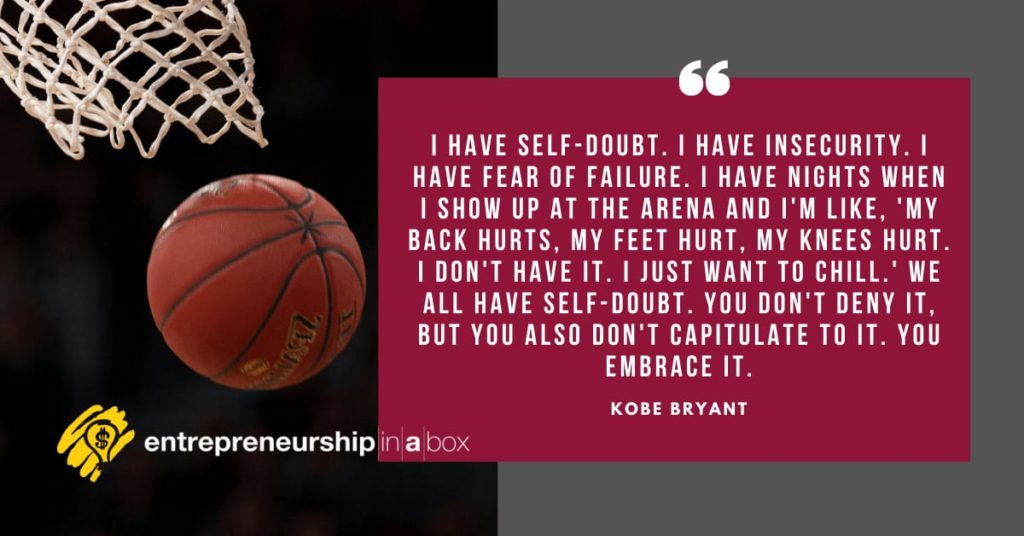
1. Your weakness as a source of your insecurities
Nobody is perfect. We have our own weaknesses for which we know or don’t know. If we become aware of them, they easily become insecurities.
If you know about your weaknesses and are convinced you’re not good at something, you will start feeling insecure about that if you do not start doing something about it.
2. Insecurities because of your self-doubt
Self-doubt is one of the highest reasons for many insecurities. On the other side, we all feel self-doubt about ourselves at some point in our life. Sometimes, we don’t know if we are good enough to deal with the surrounding things like uncertainty.
Many people don’t know if they will be strong enough, persistent, smart, and successful entrepreneurs in this world. I know many people who have never wanted to enter entrepreneurial waters because of this mindset and insecurities inside them. Because of this feeling, they escape from doing things where they feel insecure, even knowing that entrepreneurship brings many uncertainties and insecurities.
3. Low self-esteem and lack of confidence as reasons for insecurities
Low self-esteem and lack of confidence can significantly impact your life, shaping your experiences, decisions, and overall outlook. They are two separate but interconnected concepts that often coexist, amplifying each other’s effects.
Related: Real-life Organizational Decision-Making Examples
Low self-esteem is a long-term, pervasive feeling of unworthiness or inadequacy that affects how one views oneself.
For example, despite evidence to the contrary, a highly talented artist with low self-esteem might continuously de-emphasize his abilities, believing he is not good enough. This belief can affect their willingness to showcase their work, apply for jobs, or pursue art. Such people become victims of their own insecurities.
On the other hand, a lack of confidence usually is related to specific situations or abilities.
A confident public speaker might feel nervous or unsure when asked to write an article, not because they feel generally inadequate (indicating low self-esteem) but because they aren’t confident in their writing skills.
Some signs that you have low self-esteem and confidence in yourself are related to your thinking about the following:
- I never get anything right.
- I am a failure.
- Why must I try something when I know I will not succeed?
- I am a loser.
- I will never accomplish anything.
- Why can’t I finish everything I want to finish?
- I don’t know what I am doing.
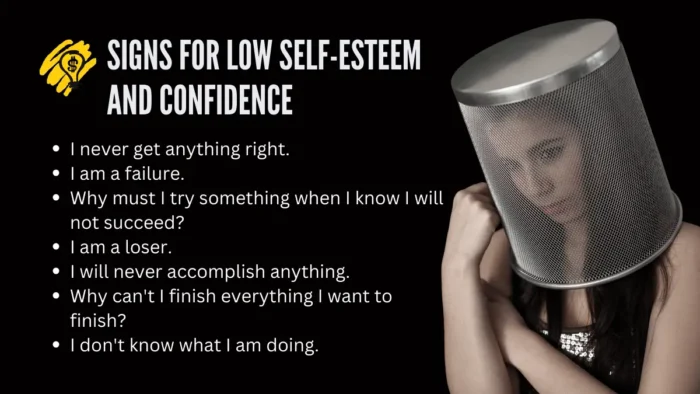
Remember that both can lead to missed opportunities and unfulfilled potential. They can also cause anxiety, depression, and other mental health issues.
4. Social anxiety as a source of insecurities
Social anxiety is a common emotional disorder that affects many people worldwide, making them feel insecure. It is characterized by a persistent and intense fear of social situations, which can lead to extreme embarrassment.
Social anxiety can be triggered by various situations, including public speaking, attending social events, or even talking to strangers.
Many people who suffer from social anxiety experience physical symptoms such as sweating, trembling, rapid heartbeat, and nausea. These symptoms can be distressing and can make it difficult for individuals to function in everyday life.
Social anxiety typically arises from a fear of being judged or evaluated negatively by others. This fear can be so intense that it prevents individuals from engaging in social interactions, such as speaking up at work or making new friends. It can also sometimes lead people to feelings of isolation and loneliness, exacerbating the condition.
While everyone occasionally experiences some degree of social anxiety, some people have more extreme forms that can significantly impact their lives.
For example, social anxiety can cause individuals to increase their insecurities in themselves and avoid certain situations or activities altogether, which can limit their experiences and opportunities.
The causes of social anxiety are complex and multifaceted. Research suggests that genetics, brain chemistry, life experiences, and relationship insecurity can all play a role in the development of social anxiety.
Negative past experiences, such as bullying or rejection in relationships, can also contribute to the development of social anxiety.
5. Body image insecurities

Body image insecurity is a common issue faced by many individuals. The societal pressure to conform to a particular body type can often lead to questions about a person’s physical appearance and whether they meet imposed beauty standards. This will lead to a negative self-image of a person.
Understanding that there is no direct correlation between body health or appearance and body image insecurity is crucial. This emotional state can affect individuals of all body types and sizes.
People dealing with body image insecurity often feel unhappy and anxious about their appearance. One of the leading causes of a negative self-image is constantly comparing oneself to unrealistic beauty standards. Recognizing this and avoiding such comparisons is essential to maintain a positive sense of your self-worth.
As you can see, if you keep saying things about yourself in a negative context, you will start believing in those things and bring up body image insecurity and negative self-image. Your self-esteem and your self-confidence will suffer.
You are allowed to judge yourself and your decisions. But be careful. You want to avoid losing your self-esteem and self-confidence. This is important because your small business will require exactly that.
6. Your competences as a source of insecurities
Your competencies come from your knowledge, skills, and experience. It is usual for you not to possess all three from the beginning and, in such a way, to have personal insecurity.
If you learn and increase your knowledge, but only if you implement it and learn from failures, you will begin mastering skills and experience.
You don’t need to be disappointed and insecure about your competence. Start doing things, and you will become better. In such a way, your insecurities will disappear.
7. Insecurities based on previous failures
In my experience, I have failed many times. I have failed as a student, employee, startup entrepreneur, and manager in a larger organization and one of my own businesses.
Many times, I was in the situation to give up after my failures. But, looking from this perspective, I thank God because I don’t give up. Sometimes, my decisions were hard to make.
Opportunity costs if I take one way instead of the other were huge. But, persistence in the journey I wanted to take at that time was vital for me. If all of those failures made me feel more insecure, I would probably make many more mistakes and failures.
Failures, in many cases, can bring negative thoughts about yourself and will lower your self-confidence. And they are simply part of the life of everyone. But, if you change these negative thoughts into opportunities to learn something from these failures, your self-confidence will rise, and the next time you will succeed.
8. Low level of motivation as a source of insecurities

If we are not motivated to do some things, we will never do them. We start procrastinating, trying to escape from what we must do.
In many cases, we try to find excuses that we are not good enough to do those specific things, and in such a way, we become insecure.
Many negative thoughts about the skills, the time required to do the job, or low levels of self-confidence can also demotivate you.
9. Insecurities because of perfectionism and past critics as a source of insecurities

Nothing is perfect in this world. Nothing you are doing is perfect 👌. I have mentioned here many times that everything can be done better. You can improve everything. And this is true.
So, why would you want to be perfect when you can have a chance to improve? There is no such thing.
Waiting to achieve perfectionism before you start doing things can bring you many insecurities inside yourself. And not only that, but also you will start having negative thoughts about yourself, and you will lose your own self-confidence. It is more important to start doing things and improve them as you go.
Past criticisms are a source of the most common insecurity in many people.
If you are criticized in the past about some work you have done or anything else, it somehow impacts your security. Those criticisms will stay in your head for a long time if you don’t look at these critics from an entirely different perspective, as something that gives you information that you need to improve yourself.
10. Unpredictable future

Yes, the unpredictability of the future is another sign of insecurity and can bring many types of insecurities.
For example, you work hard on your sales prediction, but the coronavirus pandemic makes all your predictions miss reality.
Different situations involve many different problems that we cannot control. Many of us have never been in a similar situation. So, everything is new, and we don’t know what to expect in the future.
This doesn’t mean that we need to surrender to our personal insecurities. Yes, we don’t have the tools to change our external environment. But, we can change our mental health and well-being and try to look positive in the situation by searching for new opportunities.
Signs of Insecurity That Are Affecting You and Your Small Business
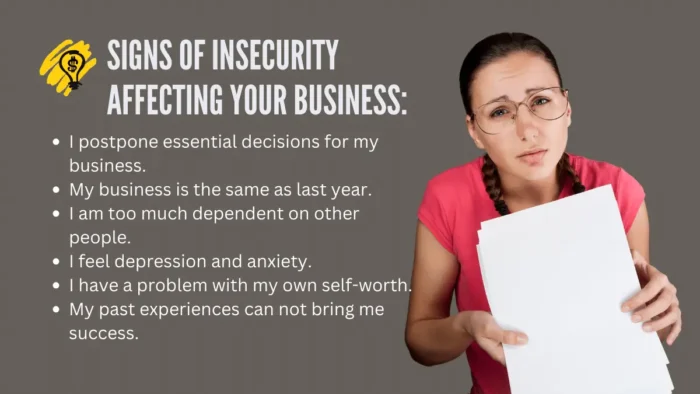
There are many signs of insecurity, but one of the most frequent signs I have seen are inside statements like this:
- I postpone essential decisions for my business. If you are feeling insecure, you will procrastinate and postpone many critical decisions or tasks you need to do for your business.
- My business is the same as last year. How can you change something inside your small business if you are feeling insecure about taking action steps? If there are no changes, it means that you are insecure about implementing them.
- I am too much dependent on other people. Suppose you always ask for validation of everything you have done. In that case, it means you don’t see your opinions as valid and acceptable. That is something you will need to change.
- I feel depression and anxiety. Insecurities can harm your physical and mental health. When you manage a business, you must ensure that your physical and mental health is on the highest possible level.
- I have a problem with my own self-worth. Insecurities about your self-worth can harm your business. You will postpone decisions, and you will not proactively take action. So, you must increase how you look at yourself by experimenting, practicing, and learning through failures.
- My past experiences can not bring me success. Past experience is important, but you can not improve it without taking action, failures, and practice. Remember that you are not born with past experiences. You can build your past experience by building new experiences.
How to Overcome Insecurities and Improve Your Self-Esteem

Now, let’s discuss actionable steps to overcome your own insecurities.
- Identify and challenge negative beliefs: The first step to removing your insecurities is recognizing destructive patterns of negative thoughts. If you believe you’re not good at something, ask yourself why. Is there concrete evidence to support this belief, or is it unfounded? This is the first step in the elimination of your insecurities.
- Set realistic goals: Setting realistic goals will help you set a clear path to where you want to be in the future. You must often exit your comfort zone and put yourself to achieve your goals if you want to eliminate your insecurities. Your goals and small wins toward achieving them will help you improve your self-conscious about your worth, increase your self-acceptance, and step-by-step to remove your feelings of insecurity.
- Practice self-compassion: Be gentle with yourself. Everyone makes mistakes and has areas for improvement. Instead of criticizing yourself, use these moments as opportunities for growth. In such a way, you will start eliminating your own insecurities.
- Seek professional help: Sometimes, the guidance of a psychologist or counselor can be valuable. They can provide personalized strategies and support to help you overcome low self-esteem and lack of confidence and, in such a way, remove different insecurities you have.
Remember, change doesn’t happen overnight. It’s a gradual process that requires patience and practice until you eliminate your insecurities and become more secure in yourself.
1. Always have goals for everything you need to do.

The first thing you need to do if you want to overcome insecurities is to write your goals on a piece of paper. Put three most important goals for you in the next twelve months.
Why do you need goals?
Setting and achieving small, manageable goals can boost your confidence and self-esteem.
For example, if you’re nervous and feel personal insecurity about public speaking, start by presenting to a small, friendly group like friends and family members before gradually working your way up to larger audiences. You will increase your experience, increase your own self-conscious about your worth, and remove any feelings of insecurity.
You need a destination before you start drawing the map where you will go. Without goals, you don’t know where you want to go. Your path will become full of unknowns in such a way that will only increase your feelings of insecurity.
2. Normalize quickly from failure if you want to overcome insecurities
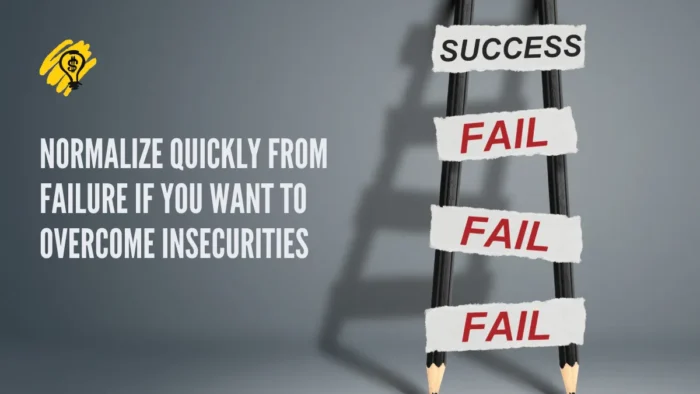
First, be aware of your failures and don’t consider them catastrophic. Look at your failures as your learning process.
Why have you failed? What can you do to prevent the same thing from happening again in the future?
These questions will give you answers to what you must do in order to escape failures in the future and remove your own insecurities in yourself.
The next important thing is persisting and pushing toward achieving your goals. Furthermore, you will need to become willing to try different action steps, strategies, and plans if it is necessary to make a change.
Remember that anything you have planned will not happen in reality. You must always be prepared that some changes must be made daily. So, your self-esteem and confidence will increase if you learn to return daily life to normal from the failure. Your insecurities to take necessary action steps will be on the lowest possible level.
3. Ask for positive feedback from a closed environment
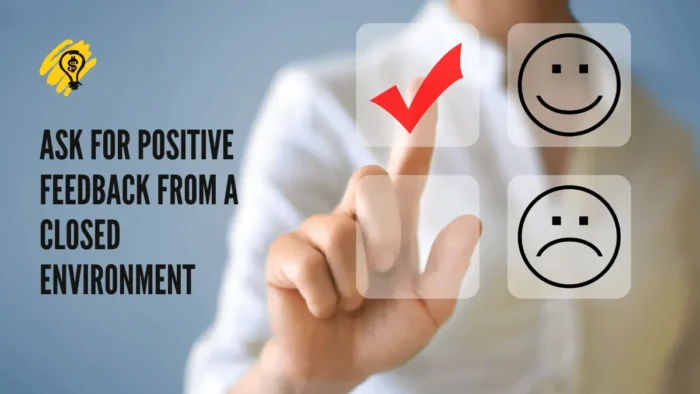
Positive feedback from a closed environment will always positively impact your self-esteem. In such a way, you will remove your insecurities one by one.
When you want to remove your insecurities about your competency, feedback or acknowledgments from your closed environment are really important.
4. Remove perfectionism inside you. Instead, do the job to overcome insecurities.

Yes, your aspiration to perfection sometimes can harm you and bring a higher level of job insecurity. One of the first things you must do is think about your work or how you are doing something. Do you have unachievable goals?
Think about how much difference in results you would have if your job were better. You will know that you can improve something so that you will not experience any insecurity related to your work.
I have seen many people with high standards and expectations for themselves. But they start feeling insecure when they don’t achieve these expectations. So, don’t be a perfectionist when you work on your goals. It can be very harmful to your self-confidence, bringing more insecurity.
Also, I think many people use perfectionism to escape going outside their comfort zone. Because of some insecurity, perfection becomes an excuse for own insecurity about doing something.
You need to do your best instead of doing it in perfection. You need the job to be done. When you know that you have put all your efforts into doing the job and the job is already done, you feel secure and will not be disappointed in yourself. In such a way, you will overcome insecurities based on perfectionism.
5. Stop comparing yourself with other people if you want to overcome insecurities

Comparing yourself with others sometimes is not helpful and can harm you. You need to use comparison only as a strategy to identify yourself with someone successful only to improve yourself and achieve your goals.
Comparing yourself with others about everything will only increase your insecurity.
6. Remove self-doubt and fear to overcome insecurities

Also, you must remove your self-doubt and fear if you want to overcome your insecurities. You can start by acknowledging that you feel self-doubt and fear of mistakes. When you become self-conscious of this, you can start planning the best way to eliminate them.
Next, think about what brings you your self-doubt and fear. Is it something good or bad? Do you feel bad or really need to feel self-doubt and fear? Also, imagine your life and business without self-doubt, common insecurity, and fear.
When you look into the better future of you, you will start feeling more confident and will overcome insecurities.
7. Always learn new things

If you want to remove the feeling of insecurities from yourself, you need to learn daily. The knowledge will increase your security and remove your negative thoughts about yourself. Once you achieve some level of knowledge, you will see how confident you will be about your action steps.
When you increase your knowledge and self-confidence, your insecurity will disappear.
8. Start experimenting

Knowing without experience is not enough for the elimination of your insecurities. Yes, you need to experience things. If you want to have experience, you need to start with experiments.
Create several experiments in the field in which you have learned something new, where you have insecurity. Create models, test them, and prove the hypothesis you set from what you have learned. Your experience will help you overcome many insecurities.
Frequently Asked Questions
Insecurity is a state or feeling that stems from a lack of confidence and belief in yourself. If you feel insecure, you probably feel like you don’t have what it takes to succeed in business or anything else.
Causes of insecurity are your own weakness, self-doubt, low self-esteem and lack of confidence, your competencies, insecurity based on previous failures, low motivation, procrastination, perfectionism, past critics, and unpredictable future.
(1) Always have goals for everything you need to do. (2) If you fail, try to normalize quickly from failure. (3) Ask for positive feedback from a closed environment. (4) Remove perfectionism inside you; instead, do the job. (5) Stop comparing yourself with other people. (6) Remove self-doubt and fear inside you. (7) Always learn new things. (8) Start experimenting.





